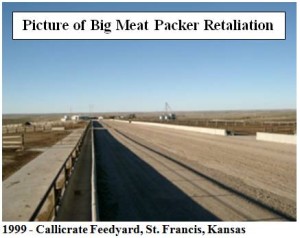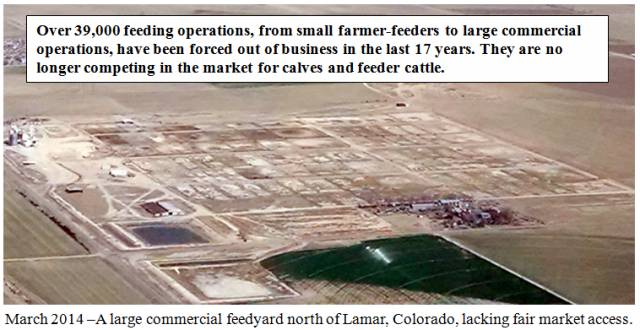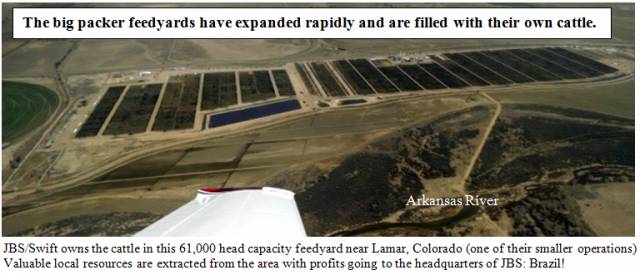
By Mike Callicrate
Some things don’t change – In 1918 the Federal Trade Commission reported packers were “manipulating markets, restricting flow of foods, controlling the price of dressed meat, defrauding producers and consumers of food, and crushing competition.” Five packers (Armour, Cudahy, Morris, Swift and Wilson) controlled half the market. The Packers and Stockyards Act of 1921 was legislated to prevent another catastrophic monopoly-like meat trust from forming again. Today, four packers control 85% of the market, and predictably, the results are the same!
Without antitrust laws protecting a fair, open and competitive marketplace, cattle feeders are easy prey to the big meat packers. Callicrate was a plaintiff in the 1996 meatpacker lawsuit Pickett vs. IBP.

How did the big packers regain their control over the marketplace?
Capture your suppliers’ trade group
In the early years after the National Cattlemen’s Association was reorganized (1996) to include the big meat packers as members and final plans were in place to capture control of the $80 million dollar per year cattlemen’s beef checkoff (Beef Tax), there was heated debate over whether packers should be allowed to own livestock. The 1921 Packers and Stockyards Act prevented meat packers from owning or controlling everything from the stockyards to retail. The Act basically was designed to prevent packers from doing anything that would have even the effect of reducing competition. Cowboys wanted to raise cattle and for packers to be packers. They wanted a tight fence between them and the packer – a competitive market. Cattle producers wanted a fair price for their cattle and the packers wanted to buy them as cheap as possible – so why were they members of the same lobbying group?
March 5, 2000, Lee Pitts wrote – “I remember the Alamo and the first NCBA Convention. When I left San Antonio four years ago after the merger I felt we in the cattle industry had just been wiped out like those independent Texans of long ago. It was a massacre. There would be no survivors. The fact that I had worked very hard to raise some valid issues about the merger and ended up being treated like the enemy was puzzling to me. But my biggest scar from the Alamo Convention was that I had been forever disillusioned with how the ‘democratic’ process DOESN’T work within our national trade organization.
“One of my main concerns about the merger was that under the new industry structure packers would have too much influence on the proposed organization without having to pay fair market value for that influence! How un-American is that?
“It’s now official policy that the NCBA will oppose any legislation that would restrict packer ownership of livestock. That was always the unofficial policy of the NCBA due to the strong influence that Texas and Kansas cattle feeders have. Now, thanks to a balloting in the Stakeholder’s Congress that included 191 voters, when that other Congress in Washington DC visits this subject they will be advised officially that the million cattlemen represented by the NCBA are against any legislation that would prevent packers from controlling the market through direct ownership of cattle.
“By the way, this piece of NCBA legislation was officially given its blessing by IBP head cattle buyer and NCBA Board member Bruce Bass.”
Obama to the rescue – The next Teddy Roosevelt?
Excerpt from candidate Obama’s REAL LEADERSHIP FOR RURAL AMERICA document:
“Prevent Anti-competitive Behavior Against Family Farms: In an era of market consolidation, Barack Obama and Joe Biden will fight to ensure family and independent farmers have fair access to markets, control over their production decisions, and transparency in prices. Obama is a strong supporter of Senator Tom Harkin’s (D-IA) legislation that protects independent producers by banning the ownership of livestock by meat packers, and he will fight for passage of the law as president. Today meatpackers produce more than 20 percent of the nation’s hogs, and their share is growing. When meatpackers own livestock, they bid less aggressively for the hogs and cattle produced by independent farmers. When supplies are short and prices are rising, they are able to stop buying livestock, which disrupts the market.
“The 1921 Packers and Stockyards Act prohibits price discrimination by meatpackers against small and mid-size farmers, but the law has not been enforced. Obama will issue regulations for what constitutes undue price discrimination and his administration will enforce the law. He will also strengthen anti-monopoly laws; change federal agriculture policy to strengthen producer protection from fraud, abuse, and market manipulation; and make sure that farm programs are helping family farmers, as opposed to large, vertically integrated corporate agribusiness.”
In 1978, when I built the first feedyard in Cheyenne County, Kansas with a group of local investors, we could sell cattle to as many as twenty meat packers located anywhere from Denver to Omaha. Packer concentration was at historic lows. The biggest and fastest growing packer, IBP, seeking guidance on how to further increase its market share and profits, had already been advised by the Boston Consulting Group to cooperate, rather than compete with the other big packers. The fool’s game was on, but those being played for fools didn’t know it yet. By 1988, after I built my own feedyard, we smelled the rat. By 1994, even in the face of increasing demand, the spring market collapsed $17/cwt. in six weeks. NCBA’s plan for packer control of the cattle industry, modeled after the chicken and pork sectors, was falling into place. Over 1,500 cattlemen gathered in Omaha for the announcement of a lawsuit. The market recovered $12 in the next couple of weeks, and cattlemen settled down, not recognizing the markets were responding to manipulation by the big packers rather than recovering as a result of fair and open competition.
By 1998, I was down to one packer-buyer, and by January of 1999, I had none.
I called the Secretary of Agriculture Dan Glickman, the top enforcer of the Packers and Stockyards Act. I asked the Secretary why he wasn’t doing his job. He responded, “It’s different now [It’s not 1921], in today’s global market we need big companies that can do business globally.” He ordered ConAgra (formerly Monfort, now JBS/Swift) to buy all of my existing cattle, after which I closed my feedyard. Fifteen families lost their jobs and the community lost a buyer of locally grown cattle and feed.

Despite the wisdom, foresight and courage of presidents like Teddy Roosevelt, Woodrow Wilson and the Congress of the early 1900s, today’s “robber baron” packers – JBS, Tyson, Cargill and National Beef – operate outside the law, with their boot firmly on the necks of cattle producers and their hands deep in the consumer’s pocket. Ranchers have gone out of business in droves, and we’re now left with the smallest cowherd since the early 1950s. Retail prices for beef have skyrocketed to the highest levels in history. Rural communities are devastated, people and animals are being exploited and abused, and the environment degraded by gigantic industrial operations: everything the Congress of 1921 had worked to avoid has happened.
Remarks by President Obama in Osawatomie, Kansas, four months after the resignation of Christine Varney, U.S. Assistant Attorney General for the Antitrust Division
Today, 14 years after Lee Pitts wrote Blue Ribbons/Red Faces: Packer control of NCBA, the cattle industry is decimated. Thankfully, Presidents Teddy Roosevelt and Woodrow Wilson had the leadership, courage and stamina it took to go after the highly concentrated wealth and power that was crushing competition in the early 1900s. President Obama made promises and held hearings that farmers spent valuable time and money traveling to in order to tell their stories, but in the end he did nothing. Assistant Attorney General Christine Varney left the job for the generous financial benefits of a corporate position. Philip Weiser, Deputy Assistant Attorney General for the Antitrust Division, left to rejoin the faculty at the University of Colorado. Grain Inspection, Packers and Stockyards Administrator Dudley Butler went home to his farm in Mississippi and continues the fight for fair markets. The president’s lack of support and the departure of the top cops gave the nod for the packers to continue raping America’s farmers, ranchers and rural communities with impunity.
In an unbelievable affront to the cattlemen driven to liquidation, their demise was financed with the cattlemen’s own money – the mandatory Beef Checkoff! Over 80% of NCBA’s overhead is paid by the beef tax, purportedly legislated to help cattle producers increase demand for their product. NCBA continues to lobby against the interests of U.S. cattle producers, opposing Country of Origin Labeling for beef, pushing for opening our borders to more cheap foreign beef, opposing market transparency and fighting enforcement of antitrust laws like the Packers and Stockyards Act. NCBA and their meat packer partners continue to ignore the harmful effects their aggressive promotion of technologies like “Pink Slime” and performance enhancing drugs have on beef demand.
With over 40% of our ranchers now out of business, over 39,000 [80,000 in 2020] cattle feeding operations closed, and the U.S. now food insecure, it’s well past time to fully expose the fraud of NCBA, separate them from their beef tax slush fund, and hold them, the packers, and the Obama administration accountable for this historic debacle. Then we can begin the work of breaking up the meat packers and other food sector monopolies and begin rebuilding a new food system that serves everyone!
OCM WINTER 2014 NEWSLETTER ARTICLES
- Vilsack Dropping Beef Checkoff Proposal; What was Vilsack thinking?
- Former GIPSA Administrator Calls for Secretary Vilsack’s Resignation
- Breakfast Roundup?
- WTO, COOL, TPP – The Alphabet Soup Of The loss of National Sovereignty
- Reform the Beef Checkoff Program: Terminate the NCBA gravy train!
- RURAL ROADS TO SECURITY: The Curse of Factory Farming
- Local Food Efforts Undermined by Pretenders, Predators and Corrupt Cops
- USDA Stonewalling Cattlemen – OCM Files Complaint
- Courage For the World Teaches Food Sustainability
- A Big Controversy is Brewing
- 36 Groups Urge Ag Secretary to Enforce Beef Checkoff Program’s Prohibition Against Conflicts of Interest; Urge Other Reforms
- Like GM, Food Companies Place Profits Over Safety and Security













